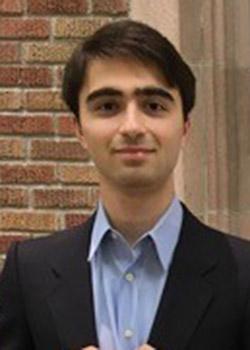Current medical student enrolled at the University of Maryland School of Medicine Class of 2023. Personal interests in cardiology and global health. (LinkedIn)
Why did you choose the UW?
The UW is famous for having a great biology department and that was my interest going into my undergraduate career. Also, I had the advantage of getting good scholarships. I received the Purple and Gold Scholarship for out-of-state students, and some money from the Biology Honors program.
Why minor in global health?
Through the Biology Honors program, I enrolled in a course that took a public health approach to HIV/AIDS. The course opened my eyes to global health. I’ve always had an interest in aid work and foreign policy, but I was never able to isolate a specific major or minor, until I found the Global Health Minor. It was exactly what I wanted to do.
How does it complement your core studies?
The Biology Major is 100 percent what I expected – pure science and raw data. I wanted to learn more about the real world when it comes to medicine and health, and that’s what the global health minor is able to provide. It showed me that medicine isn’t just about cells and organs. It’s also about communities, connections between doctors, challenges of getting healthcare to different parts of the world, and sociological issues that come about when you have to deal with disease and illness.
What was most valuable about your global health coursework?
The epidemiology and pathobiology courses, which looked at diseases in ways I had never considered before. We studied diseases less as viruses that attack the body and more as large-scale issues that affect entire communities. I learned that fighting diseases isn’t only a factor of finding a cure, it’s also about disseminating that cure and spreading information, while destroying misinformation.
What experiences at the UW have been most influential?
I’ve done a lot of volunteer work at hospitals, which has helped me recognize the realities of working as doctor, and made me appreciate the work they do every day. I’m an officer for an RSO (Registered Student Organization) called Husky CERT, the community emergency response team. We get people First Aid certified and trained in emergencies and disasters. I’ve also done research with a team of anesthesiologists from UW Medical Center and Harborview.
Can you tell us more about your anesthesiology research?
It was through the Scan Design Innovations in Premain Research Summer Program, which connects students to researchers in pain medicine. We did research on chronic headaches, looking specifically at the greater occipital nerve block, an injection of local anesthetic and steroid around the nerves that supply the scalp. It’s been shown to be effective at reducing headaches, but there isn’t much data on the long-term effects. We’re trying to see what those effects are and if we can predict the efficacy of treatments based on the kind of headaches people have.
Any study abroad experiences?
I took part in the Dark Empire seminar with Clarence Spigner during my sophomore year. He really is a bright individual that fully radiates knowledge. I enjoyed talking about a wide range of topics, from racism in England and the U.S. to Brexit. I was born in London, while my father was doing a postdoc, and Dark Empire allowed me to explore London like I never had before.
What were some important things you learned?
I realized just how diverse London became over time and is now. I also came to recognize just how interrelated sociological issues of racism and structural violence are to health. We tend to assume that health is all about biology and the presence of disease, but social issues play a critical role.
Afterwards, I went backpacking across Europe. I burnt through a lot of my savings and got lost more than once, but it was worth it. I went to Brussels, Amsterdam, Copenhagen, Budapest, Vienna and Prague.
What are your professional goals?
I plan on going to medical school. I’ve grown particularly interested in cardiology and anesthesiology, but I look forward to discovering other areas of interest as a med student. In the longer term, I see myself doing some policy and global health work with either the World Health Organization or the United Nations. Combating diseases and improving international health has always been a passion, so I’d like to dedicate some time to that.
What do you like to do for fun?
My guilty pleasure is board games – anything that has to do with dice or cards. I also enjoy simply catching a bus and heading downtown to explore the city.
Learn more about the Global Health Minor for undergraduate students.

